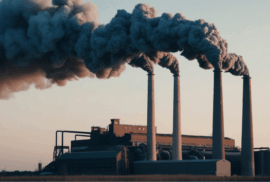Meaghan Rea, 2025 AJ Birkbeck Scholarship Winner

Authored by
U-M PhD student making sure PFAS does not complicate pregnancy
When Meaghan Rea goes to work, she sometimes has to get the tissues ready.
The kind from the human body, that is. Not the Kleenex kind, although the potential impact Rea’s work might have on parents and children could induce some sniffles and tears.
Rea studies and tests tissues taken (with consent) from placentas of women at a hospital across the street from the University of Michigan lab she works at.
“It’s the best kind of tissue to get because somebody’s being born and not the other way around,” she said.
The toxicology doctoral student is studying whether a vast group of manmade chemicals called per- and polyfluoroalkyl substances, known as PFAS, might harm women and children during pregnancy and birth. If Rea finds a correlation between PFAS and pregnancy complications, her research could support new medical care to protect people. It could even move business and government leaders to eliminate the use PFAS entirely.
For her work, the PFAS Alliance and the Michigan Environmental Council have awarded Rea the AJ Birkbeck Scholarship, a monetary award given to students at a Michigan college or university completing research or projects around PFAS.
PFAS were created to resist. For decades, producers have used its abilities to repel water, grease, oils and sticky substances from shoes, pots, pans, cosmetics, even firefighting foam.
But these chemicals can also resist breaking down. They last a long time wherever they end up, which is many places. PFAS is now found in waterways, soil samples, fish stomachs and even human organs, like placentas. This ubiquitousness is thanks to the breakdown of the products that have PFAS in them and the outright dumping of these chemicals by industries.
It is the sort of injustice AJ Birkbeck, whom Rea’s scholarship is named after, fought against. He served as an attorney for west Michigan residents concerned about a shoe company’s dumping of PFAS in their community. It helped spark national attention to the chemicals and statewide change.
Despite PFAS being used for decades, and despite some companies knowing their dangers, society is still trying to understand their reach and their repercussions.
Some studies have connected PFAS to troubles women have conceiving children, with high blood pressure during pregnancy and with developmental issues in fetuses and infants. Rea is adding to this body of research.
“Broadly, I’m trying… to better understand how PFAS disrupts things in the gestational department… and how that influences peoples’ pregnancies,” she said.
Rea is studying how PFAS reacts with placentas as part of U-M’s School of Public Health. Placentas not only connect the fetus to the parent during pregnancy but also help move nutrients and waste between the two.
Immune cells called macrophages are part of a placenta’s makeup, the “first responders for infection” as Rea puts it. They also repair and remodel placental tissue as a fetus rapidly develops.
A pregnancy is split into trimesters, and macrophages play a different role in each. In the first trimester, they make sure pregnancy happens successfully. In the second, they drive the growth of the fetus. In trimester three, they get things ready for childbirth.
Macrophages do this by inflaming placental tissue at times while at other times being anti-inflammatory. In all, a good macrophage improves the chances of a healthy pregnancy and childbirth.
Rea studies whether PFAS disrupts the macrophage’s work. If the chemical group does this, Rea will determine the risks they pose on women’s fertility, on healthy fetus growth and on childbirth.
“On a really, really large scale, I’m hoping that my research can be one of just many that improves health interventions and serves as a scientific foundation for environmental policies, especially if they reduce PFAS production and pollution,” she said.
It is the latest in a career of protecting peoples’ health. She got her start at an engineering firm working to provide clean and safe drinking water and wastewater to communities. This led her back to school on a public health path, where she studied connections between heavily polluted sites and reproductive health. Now, at U-M, she is pursuing a PhD in toxicology.
Rea’s number one hope for her research, which the AJ Birkbeck Scholarship will provide $3,000 to support, gets back to what moved her all those years ago as an undergraduate: wellbeing.
“If my work helps even just one person have a safer pregnancy or a better birth outcome, that’s really the goal,” she said.
Discover
Power environmental change today.
Your gift to the Michigan Environmental Council is a powerful investment in the air we breathe, our water and the places we love.
Sign up for environmental news & stories.
"*" indicates required fields




